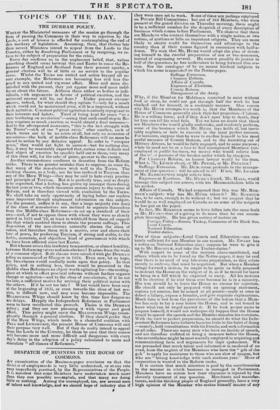TOPICS OF THE DAY.
THE DURHAM POLICY.
WHILST the Ministerial measures of the session go through the form of passing the Commons in their way to rejection by the Lords, a sort of leisure is afforded for contemplating the end of this mockery of legislation. Assuming, then, that (better late than never) Ministers intend to appeal from the Lords to the Country, either by dissolving Parliament or by resigning, we re- turn to the subject of preparation for the crisis.
Every (lay confirms us in the unpleasant belief, that, unless something should occur betwixt this and Easter to rouse the Re- formers of England and Scotland from their present apathy, a general election will be of little or no service to the popular cause. Whilst the Tories are united and active beyond all re- cent example, the Retbrmers are becoming less and less dis- posed to any united and vigarous effort. More and more dis- eatiNfied with the present, they yet appear more and more indif- ferent about the future. Address them either as bodies or indi- viduals, ‘( ith arguments in favour of political exertion, and the universal answer will he, cui bon° Under present eircum-: stances, indeed, for what should they agitate ?—only for a result which could not be maintained even, still less improved, without fresh agitation. Constant political agitation is entirely repugnant to
their interests and habits. Tired of being kept for years "in a state bordering on revolution"—seeing that each small step in Re- form requires as much exertion as would obtain f a final measure— deaf to the oft-repeated assurance, "this is the last struggle with the Tories"—sick of one "great crisis" after another, each of which turns out to be no crisis at all, but only an accession of uneasitiess—the bulk of middle-class Reformers will no more be stirred to action by any delusive appeal. In order to "conquer peace," they would yet fight in earnest—but for nothing else. Nay, it may be reasonably expected that, unless some definite and final object of exertion be speedily held out to them, very many of this class will, for the sake of peace, go over to the enemy. Another circumstance conduces to desertion from the Reform ranks. There is no greater mistake than to suppose, as some do, that many of the non-electors wish well to the Tories. The working classes, as a body, are far less inclined to Toryism than any of the Mere Whigs—they may be said to hate every practice and principle of Toryism. But it is perfectly true, and as deeply to be regretted, that a feeling has grown up amongst them during the last year or two, which threatens serious injury to the cause of Reform, and is therefore viewed with exultation by the Tories.
We shall take an early opportunity of laying before our readers some important though unpleasant information on this subject. Fur the present, suffice it to say, that a large majority (we fear) of the class of non-electors are inclined to separate themselves from the Middle-class Reformers—to set up a standard of their own—and, if not to oppose those with whom they were so closely united in 1831 and '32, at least to withhold from them all support like that which enabled them to obtain the present suffrage. This disposition of the non-electors naturally alarms the class of voters, alid furnishes them with a motive, over and above their love of peace, for preferring Toryism, if strong and stable, to the feeble, uncertain, and objectless kind of government with which we have been afflicted since last Easter.
But whence arises this tendency to separation, or almost hostility, between Reforming voters and non-electors? It arises from the want
of a common object. Both classes were satisfied with he DURHAM
policy as announced at Glasgow in 1834. Even now, let us hope, the two classes would cordially unite upon that policy. In that policy, and in nothing less, there would be presented to the Middle class Reformers an object worth agitating for—the resting. place at which to effect practical reforms without- further organic change or agitation—and to the class of non-electors, if it be not too late, a sufficient motive for reviving their political union with the others. If it be not too late I What would have been easy at the beginning of 1835, or even towards the close of last ses- sion, is difficult now, and may soon become impossible. The
MELBOURNE Whigs should know by this time how dangerous are delays. Happily the Independent Reformers in Parliament seem to have recollected this proverb. Theirs is the DURHAM policy ; and they are now pursuing it with vigour and good effect. This policy might carry the MELBOURNE Whigs trium- phantly through a general election. -If they should prefer that of the Mere Whigs, which tends to a shameful coalition with PEEL and LYNDHURST, the present House of Commons will suit their purpose very well. But if they do really intend to appeal from the Lords to the Country, let them be sure that their course will become more and more difficult and dangerous with every day's delay in the adoption of a policy calculated to unite and .stimulate " all classes of Reformers."


























 Previous page
Previous page